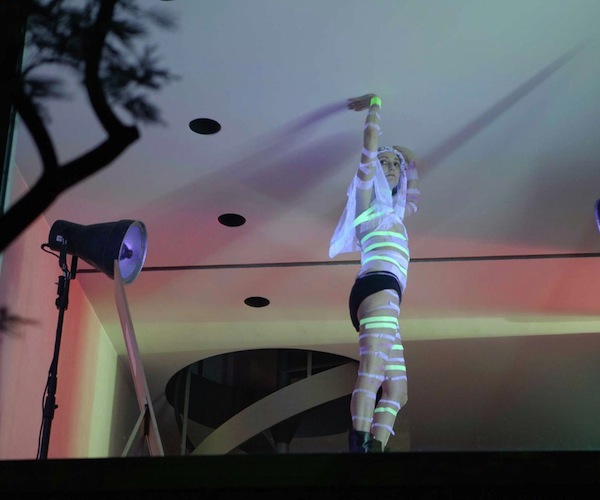Movie Review: Joanna Hogg’s “Exhibition” — Voyeurism Revisited
Seeing Exhibition is like spying through a window on our most glamorous neighbors moving about their flat: it’s kind of kinky, kind of fun.
Boston Area Film Schedules – What is playing today, Where and When
Exhibition, directed by Johanna Hogg. At the Museum of Fine Arts, Boston, Barbara and Theodore Alfond Auditorium (Auditorium G36), Boston, MA, opens tomorrow through September 5.
By Gerald Peary
Joanna Hogg’s Exhibition is yet another self-conscious, slowly unwinding art film which critics — an 86% Rotten Tomatoes approval rating — swoon about while regular moviegoers — a tepid 58% approval — scratch their noggins. Where’s the damned story? I’m somewhere in between my erudite reviewer peers and the impatience of regular folk. I agree that Exhibition is scandalously short of a narrative, and a wee bit boring. But I see all that as a planned tease by the clever British filmmaker, a coy gaming strategy, her stubbornly holding out from revealing much of anything. I mean, Hogg’s husband-and-wife protagonists don’t even have names, they are D and H, for no reason at all. As for what they do, D (played by conceptual artist Liam Gillick) might be an architect, though we never see his work, or him work. H (ex-Slits guitarist, Viv Albertine) is some kind of performance artist, I surmise, but her impromptu “performances” at home veer close to exhibitionist hysteria. See below.
As for the title, Exhibition. On a metaphoric level, it’s the West End Londoners, D and H, who are on exhibition, living in a fanciful modernist house with plate glass windows on all sides, plus we, the film audience, peeking in. On a literal level, you’ve got to hold on until the penultimate scene when one of the characters casually reveals what “Exhibition” means. Something literal and obvious.
The plot. D and H have put their precious home up for sale, bringing in a real estate agent to take care of the transaction. End of plot. We are offered no reason why they want to sell it, after two decades residing there. We find out that H seems upset about moving out, and both are concerned that the home will be bought by greedy developers, who could turn the architect-designed building into condos.
For much of the movie, Hogg cuts between D and H at their desks on separate floors. Occasionally, one will telephone the other about coming around and having sex. 39 minutes into the film, H gets a call from D, him saying “I love you.” At 1:08, H calls D for assurance. “Do you still love me? Just needed to know.” We see far more of H than D. It’s really her story, he’s close to The Other. We hear of her insecurities around him, “I don’t want your judgment. It derails me.” And we share her subjective, fearful view of the world. Some of the sounds, some of the images, seem expressionistic, reflections of her warped psyche. In a much lower key, Exhibition is sometimes like an Ingmar Bergman marital melodrama, with the actors, Gillick and Albertine, simulations of Erland Josephson and Liv Ullmann.
Is D a kind, supportive husband or a self-absorbed ogre? Or both? It’s hard to judge, since we are watching him through H’s dissatisfaction. Exhibition has several great sex scenes, or fumbled sex scenes, what happens when a couple has done all this so many many times, and they can’t find ways to drum up excitement. So, as a result, H has this secret sensuous life. She talks to a pretend male lover by way of a tape recorder. She puts on high heels, massages her breasts, masturbates in bed while D sleeps.
And then there are her “performances.” Leaving space to peer through between her Venetian blinds, she sits spread-legged in black undies. She tapes up her bosom like a Betty Paige S&M shoot. Is anyone out there watching? Once it’s her husband, prowling outside the house. Always, it’s us at the rear window. And what does all this mean? It’s not only filmmaker Hogg who is tight-lipped, it’s her guarded, reserved protagonists, Brits in an architectural box. My verdict? D and H don’t say much, do much, emote much. Still, seeing Exhibition is like spying through a window on our most glamorous neighbors moving about their flat: it’s kind of kinky, kind of fun.
Gerald Peary is a professor at Suffolk University, Boston, curator of the Boston University Cinematheque, and the general editor of the “Conversations with Filmmakers” series from the University Press of Mississippi. A critic for the late Boston Phoenix, he is the author of 9 books on cinema, writer-director of the documentary For the Love of Movies: the Story of American Film Criticism, and a featured actor in the 2013 independent narrative Computer Chess.

